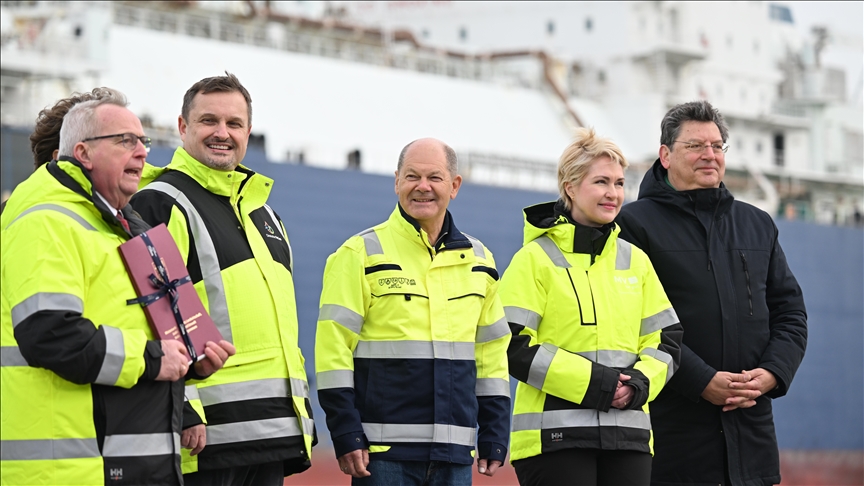German chancellor inaugurates 2nd LNG terminal
Terminal based in Baltic Sea town of Lubmin will supply up to 5.2 billion cubic meters of natural gas annually, primarily to eastern Germany
 German Chancellor Olaf Scholz (C) attends the opening ceremony of Germany's first private floating liquefied natural gas (LNG) Storage and Gasification Unit (FSRU) at the harbour in Lubmin, Germany on January 14, 2023. ( Abdulhamid Hosbas - Anadolu Agency )
German Chancellor Olaf Scholz (C) attends the opening ceremony of Germany's first private floating liquefied natural gas (LNG) Storage and Gasification Unit (FSRU) at the harbour in Lubmin, Germany on January 14, 2023. ( Abdulhamid Hosbas - Anadolu Agency )
BERLIN
The second German terminal for liquefied natural gas (LNG) on Saturday officially started operations in the Baltic Sea town of Lubmin, with the chancellor ushering in the ceremonial start, according to private news broadcaster n-tv.
Olaf Scholz saw the operators of the plant receive the necessary license and then visited the floating terminal, as gas is already being piped in as part of a test run.
The new terminal will supply up to 5.2 billion cubic meters of natural gas annually, primarily to eastern Germany.
This is the second German LNG terminal now operational after last month’s inauguration of a terminal in the northern port city of Wilhlemshaven.
"We are pleased that we are taking another step towards energy security in Germany today," said Manuela Schwesig, the minister president of the state of Mecklenburg-Western Pomerania.
Another terminal in the northern town of Brunsbuttel is scheduled to follow shortly.
LNG is delivered by ship from several regions of the world, converted back into gas, and fed into the gas network.
After Moscow launched its war on Ukraine last February, Germany quickly decided to build its LNG infrastructure to make its energy supply independent of pipeline gas from Russia, he said.
Germany plans to have a total of five floating LNG terminals by the end of 2023 with an import capacity of over 30 billion cubic meters of gas.
According to the German government, the planned LNG terminals can meet a third of the country’s natural gas needs.
Scholz gave the nod for the construction of terminals in Wilhelmshaven and Brunsbuttel on Feb. 27, just three days after the start of the war.
Berlin is trying to diversify its natural gas supply sources by purchasing more gas from Norway and increasing imports via pipelines from Belgium and the Netherlands.
Before the Ukraine war, Russia was supplying 55% of Germany’s natural gas.
Since the Nord Stream pipeline explosions in September, Germany has been importing no gas from Russia.
Anadolu Agency website contains only a portion of the news stories offered to subscribers in the AA News Broadcasting System (HAS), and in summarized form. Please contact us for subscription options.

